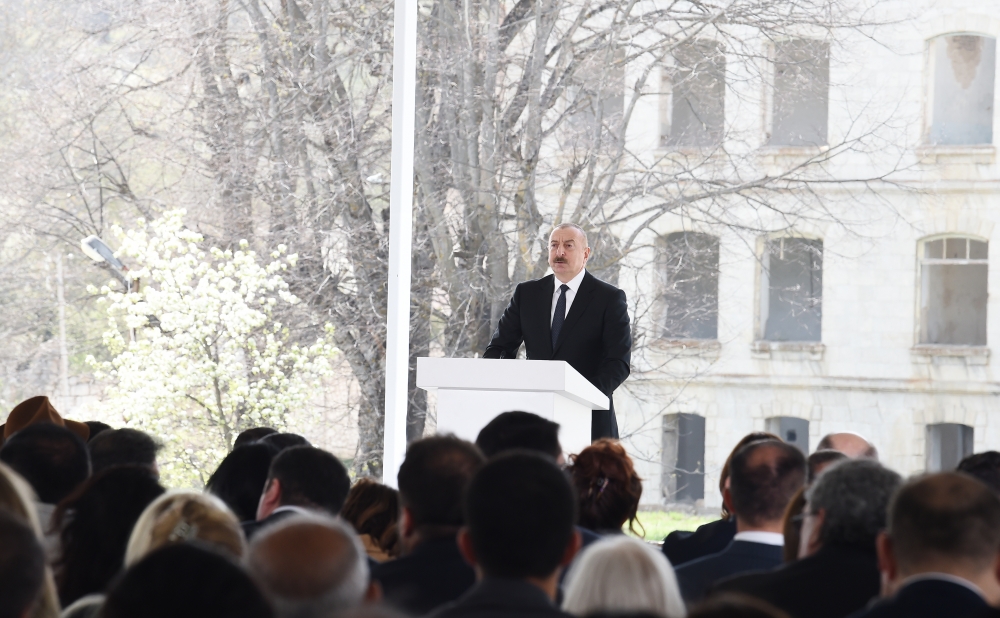Three of the five principles of the peace treaty have been agreed upon. What about the rest? Views from Baku
Principles of a peace treaty
Three basic principles of peace and normalization of relations have been agreed upon by Azerbaijan and Armenia, according to Nikol Pashinyan today. In February 2021, Azerbaijan proposed a peace treaty based on five principles. Which of these five principles are not agreed upon? JAMnews learned the opinion of expert Haji Namazov on this issue, according to whom “the other two principles complement the agreed three, but do not replace them.”
- “If Georgia gets candidate status, we will go to elections with a strengthened position” – Speaker of Parliament
- Armenian government assistance to those displaced from Nagorno-Karabakh
- “I miss our home”. The story of 70-year-old Vidadi Mammadov, who is waiting to return to Khojaly
Speaking in Parliament today, Armenian Prime Minister Nikol Pashinyan said that three basic principles of peace and normalization of relations with Azerbaijan have been agreed upon:
- The Republic of Armenia and the Republic of Azerbaijan recognize each other’s territorial integrity: the Republic of Armenia has 29.8 thousand sq. km. and the territory of Azerbaijan has 86600 sq. km.
- The parties agree to delimit on the basis of the Almaty Declaration.
- Regional transport shall be opened on the basis of sovereign jurisdiction of the parties, and regional transport shall operate on the basis of reciprocity and equality.
“These 3 principles plus, of course, another fundamental circumstance that in the course of these relations, the parties refuse to use force or threat of force,” the Armenian prime minister said.
What are the five principles?
In February 2021, three months after the end of the second Karabakh war, official Baku offered Yerevan peace negotiations based on five principles, prepared in accordance with international law and the UN Charter:
- mutual recognition by the states of each other’s sovereignty, territorial integrity, inviolability of state borders and political independence;
- Mutual confirmation by the states of the absence of territorial claims against each other and their assumption of a legal obligation not to make such claims in the future;
- refrain from jeopardizing each other’s security in international relations, from using threats and force against each other’s political independence and territorial integrity, as well as other circumstances inconsistent with the purposes of the UN Charter;
- delimitation and demarcation of the state border, establishment of diplomatic relations;
- opening of transport, establishment of other relevant communications and cooperation in other spheres of mutual interest.
Expert’s comment
According to political observer Haji Namazov, the three principles mentioned in Pashinyan’s speech repeat three of the five principles proposed by Azerbaijan:
“The Armenian version of the agreed principles does not contain two proposed by Azerbaijan.
These are mutual confirmation by the states of the absence of territorial claims against each other and their assumption of a legal obligation not to make such claims in the future, as well as a condition to refrain from jeopardizing each other’s security in international relations, from using threats and force against political independence and territorial integrity, andother circumstances not in line with the purposes of the UN Charter.
In fact, these two conditions, which Pashinyan did not specify but which are in Baku’s proposals, stem from the principle of countries recognizing each other’s territorial integrity. But it is important to emphasize that these two principles complement the agreed three, but do not replace them.”
Namazov noted that recognizing territorial integrity does not mean excluding claims in the future:
“What is the essence of the issue? The Armenian constitution mentions that this country has claims to the territory of Azerbaijan. It is clearly stated there that Armenia recognizes the “declaration of independence of NKR”. In other words, before sitting down at the table of peace talks, Armenia is obliged to remove this clause from its Basic Law. Otherwise, recognizing the territorial integrity of Azerbaijan looks like nothing more than hypocrisy.
It is also important that countries, having signed a peace treaty, do not threaten each other’s territorial integrity and sovereignty within the framework of international relations. Recently, namely after the Armenian residents of Karabakh voluntarily left the territory of Azerbaijan, in almost all their international contacts Armenian officials talk about Karabakh as allegedly disputed territories. I am not talking about the ridiculous statements of their foreign opponents about some kind of sanctions against Azerbaijan, a country that has conducted a counter-terrorist operation within its internationally recognized borders.
It is clear to me from all of the above that without the adoption of all five basic principles proposed by Azerbaijan, a peace treaty is out of the question.”
“Azerbaijan insists on signing a peace agreement”
Azerbaijani Deputy Foreign Minister Elnur Mammadov made important statements today on the topic of peace talks with Armenia.
“The Azerbaijani state is committed to the peace agenda. President Ilham Aliyev always talks about it. Thus, in February 2021, Azerbaijan sent an official proposal to Armenia to sign a comprehensive peace agreement.
Unfortunately, the Armenian side did not respond to this proposal for about a year. In addition, Azerbaijan sent a proposal to Armenia on the five basic principles of the peace agreement, which was first mentioned in February 2022. The international community, third countries and parties assisting in this process were also informed,” the deputy minister reminded in an interview with AzərTAc.
He added that Armenia decided to start discussing the terms of a future peace agreement with the Azerbaijani side only after another meeting held in August 2022:
“We can say that for almost a year and a half Armenia did not respond to this proposal at all. If we pay attention to the last year, peace talks were held on several platforms, concrete and detailed proposals were presented to the other side regarding the terms of the future peace agreement. Armenia has also presented its comments and position to Azerbaijan.”
The deputy foreign minister asserts that Azerbaijan insists on signing the peace agreement:
“Azerbaijan’s proposal regarding the peace agreement remains in effect today. So first steps should be taken by Armenia. As of today, most of the points of the peace agreement have been agreed upon by the parties. We believe that after the Azerbaijani state has fully restored sovereignty over its internationally recognized territories in Karabakh, the process of reaching a peace agreement has become easier and the likelihood of its signing should be high.”
Principles of a peace treaty




















